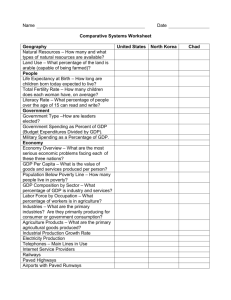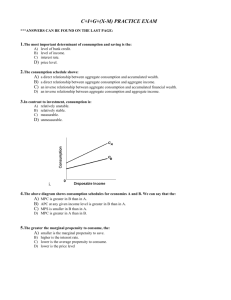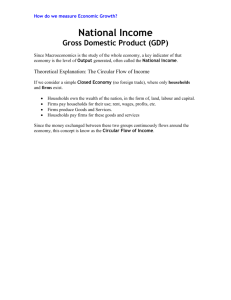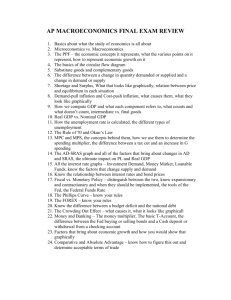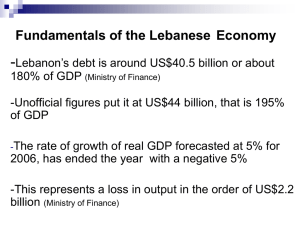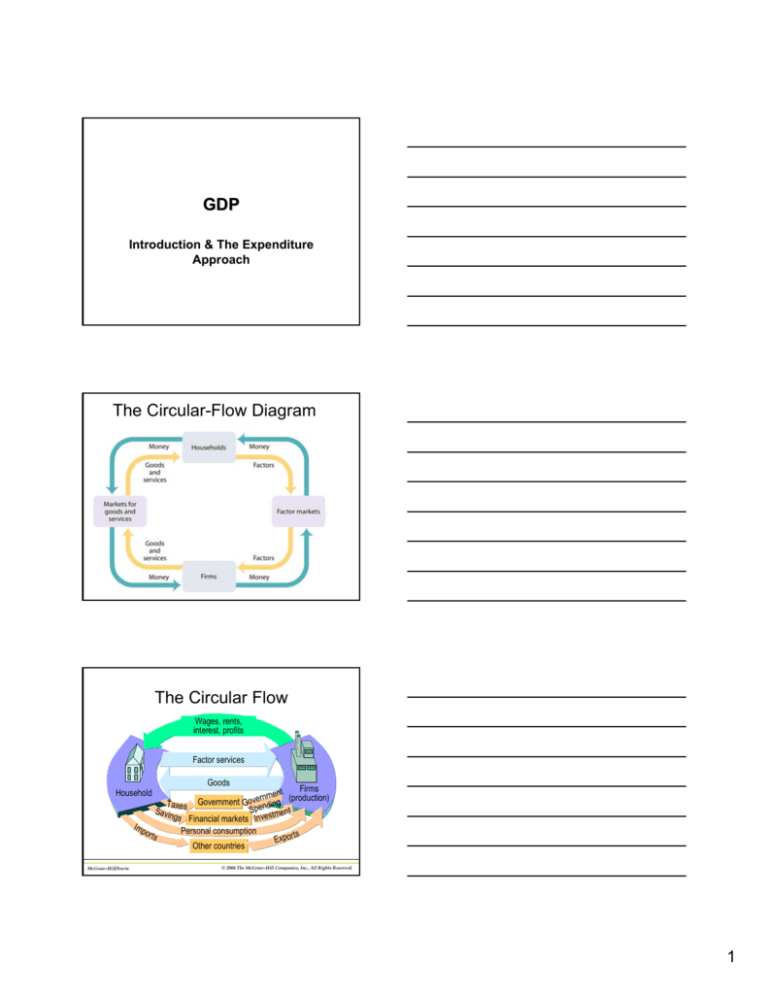
GDP
Introduction & The Expenditure
Approach
The Circular-Flow Diagram
The Circular Flow
Wages, rents,
interest, profits
Factor services
Household
Firms
nt
rnme (production)
Taxes Government Goveending
Sp
Savin
nt
gs Financial markets Investme
Im p
o r ts
McGraw-Hill/Irwin
Goods
Personal consumption
Other countries
rts
Expo
© 2004 The McGraw-Hill Companies, Inc., All Rights Reserved.
1
The National Accounts
¾Households earn income via the factor
markets from wages, interest on bonds,
dividends on stocks, and rent on land.
An Expanded CircularCircular-Flow Diagram: The Flows of Money Through the
Economy
Income from the Factor
Market
Income received by
Households
• Wages
• Rent
• Interest
• Profit
Factors of
Production
• Labor
• Land
• Financial Capital
• Physical Capital
2
The National Accounts
¾Via the financial markets, private
savings is channeled to firms for
investment spending (I).
An Expanded CircularCircular-Flow Diagram: The Flows of Money Through the
Economy
Investment Spending
• Spending on productive physical capital
and changes to inventories
– Inventories seen as contributing to the
future sales of the firm
• Spending on additional inventory adds to
Investment spending
• Drawing down inventories is counted as fall in
Investment spending
3
The National Accounts
¾ Government purchases of goods and
services (G) is paid for by tax receipts as well
as by government borrowing.
An Expanded CircularCircular-Flow Diagram: The Flows of Money Through the
Economy
The National Accounts
• Exports (X) generate an inflow of funds into
the country from the rest of the world
• imports (IM) lead to an outflow of funds to
the rest of the world. Foreigners can also
buy stocks and bonds in the U.S. financial
markets.
4
An Expanded CircularCircular-Flow Diagram: The Flows of Money Through the
Economy
GDP=C+I+G+(X-IM)
•
•
•
•
•
C
I
G
X
IM
•
•
•
•
•
Consumer spending
Investment
Government
Exports
Imports
What Is GDP?
• GDP is the nation’s expenditures on
all FINAL goods and services
produced during the year at market
prices.
Copyright ©2002 by The McGraw-Hill Companies, Inc. All rights reserved.
9-3
5
The Flow Not Stock
• With GDP we are measuring a Flow
or a movement NOT a Stock
– The store of wealth is a stock concept.
A Stock Concept
• An adult male of
average size
normally has
about 6 quarts
(5.6 liters) of
blood.
• This is an stock
concept.
How
Much is
a
Stock
Concept
GDP is a flow concept
Income Arm
In Macroeconomics
The
sameGDP
wayisyour
In Macroeconomics
Measuring
similar
Expenditures
blood
pressure
is the
to taking your blood
same onEquals
both arms
pressure.
Income
Expenditure Arm
6
How GDP Is Measured?
Income (wages, salary, rent, interest, profits)
Households
Firms
Expenditures by Consumers, Investors, Government, and Net Exports
9-6
Copyright ©2002 by The McGraw-Hill Companies, Inc. All rights reserved.
How GDP Is Measured?
Income (wages, salary, rent, interest, profits)
Firms
Same As
Households
Expenditures by Consumers, Investors, Government, and Net Exports
9-7
Copyright ©2002 by The McGraw-Hill Companies, Inc. All rights reserved.
How GDP Is Measured?
Income (wages, salary, rent, interest, profits)
Value of what is
produced
Firms
Same As
Households
Value of what is
spent
Expenditures by Consumers, Investors, Government, and Net Exports
Copyright ©2002 by The McGraw-Hill Companies, Inc. All rights reserved.
9-8
7
How GDP Is Measured?
Income (wages, salary, rent, interest, profits)
Flow of Income
Approach
Value of what is
produced
Same As
Firms
Expenditures
Approach
Households
Value of what is
spent
Expenditures by Consumers, Investors, Government, and Net Exports
9-9
Copyright ©2002 by The McGraw-Hill Companies, Inc. All rights reserved.
How GDP Is Measured?
Income (wages, salary, rent, interest, profits)
Flow of Income
Approach
Value of what is
produced
Same As
Firms
Expenditures
Approach
Households
Value of what is
spent
Expenditures by Consumers, Investors, Government, and Net Exports
(GDP = C + I + G + Xn )
•
Consumption
–
–
–
–
•
Investment
–
–
–
–
•
The Components of GDP,
2000 (in $ billions)
Durable goods …………$ 820
Nondurable goods …….. 2,010
Services ……………….. 3,929
Total C …………………………….$6,759
Plant & Equipment …….$ 1,361
Residential Housing …… 416
Inventory change ……….
57
Total I ……………………………….1,834
Government Purchases
– Federal ………………….$ 595
– State and Local …………. .1,148
– Total G ……………………………..$1,743
•
Net Exports (Xn)
– Exports ………………….$ 1,099
– Imports …………………..- 1,466
– Xn …………………………………$ - 370
•
GDP …… …………………………$9,966
Copyright ©2002 by The McGraw-Hill Companies, Inc. All rights reserved.
9-4
8
•
Consumption
–
–
–
–
•
Investment
–
–
–
–
•
The Components of
GDP, 2000 (in $billions)
Durable goods …………$ 820
Nondurable goods …….. 2,010
Services ……………….. 3,929
Total C …………………………….$6,759
GDP = C +
I + G +
Xn
Plant & Equipment …….$ 1,361
GDP =6,759+1,834+1,743+(-370)
Residential Housing …… 416
Inventory change ……….
57
GDP = 9,966
Total I ……………………………….1,834
Government Purchases
– Federal ………………….$ 595
– State and Local …………. .1,148
– Total G ……………………………..$1,743
•
Net Exports (Xn)
– Exports ………………….$ 1,099
– Imports …………………..- 1,466
– Xn …………………………………$ - 370
•
GDP …… …………………………$9,966
Copyright ©2002 by The McGraw-Hill Companies, Inc. All rights reserved.
9-5
GDP is a flow concept
Income Arm
In Macroeconomics
Expenditures
Equals
Income
Expenditure Arm
What’s measured on the
income side?
Income received
by Households
• Wages
• Rent
• Interest
• Profit
Factors of
Production
• Labor
• Land
• Financial Capital
• Physical Capital
9


